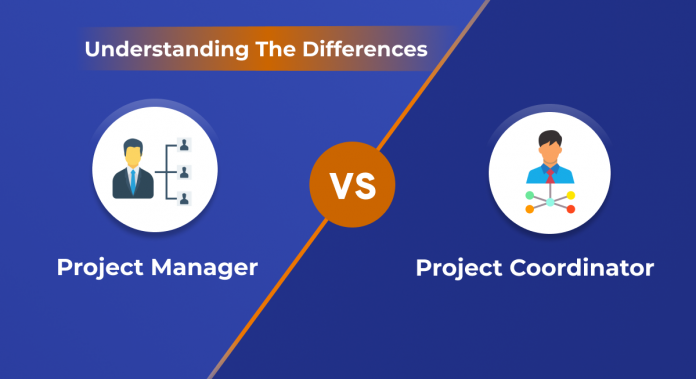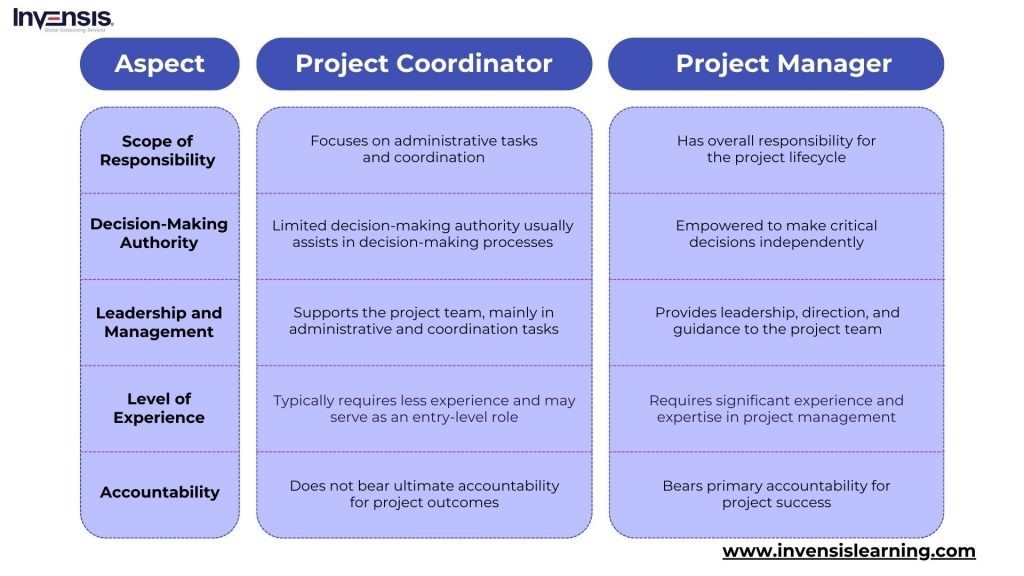
Have you ever wondered what the difference is between a project manager and a project coordinator? Both roles sound similar, but they play distinct parts in bringing a project to life.
This blog post will cut through the confusion and explain the key responsibilities of each position, explore the skills they require, and highlight the career paths they represent.
Whether you’re considering a career in project management or simply want to understand how project teams function, this guide will shed light on the unique contributions of project managers and project coordinators.
Table of Contents
- What is a Project Coordinator?
- What is a Project Manager?
- Project Manager vs Project Coordinator: Key Differences
- Transitioning from Project Coordinator to Project Manager?
- Conclusion
What is a Project Coordinator?
In project management, a Project Coordinator is a key team member responsible for assisting the Project Manager in various administrative tasks and coordination efforts throughout the project lifecycle.
The role of a project coordinator often involves organizing meetings, maintaining project documentation, tracking progress, and facilitating communication among team members.
Here are some key roles and responsibilities typically associated with a Project Coordinator:
- They help in the initial planning stages of a project, including defining project scope, objectives, timelines, and resources required
- A Project Coordinator help in assigning tasks to team members and ensuring that the necessary resources are available to complete those tasks efficiently
- They serve as a bridge between different teams and individuals involved in the project. This involves facilitating communication, scheduling meetings, and ensuring that everyone is aware of their roles and responsibilities
- They identify potential risks and issues that may arise during the project and work with the project team to develop strategies for mitigating them
- Project Coordinators play a role in ensuring that project deliverables meet quality standards and client expectations. This may involve conducting quality reviews, performing testing, and gathering feedback from stakeholders
- They provide support to team members as needed, helping to resolve conflicts, providing clarification on tasks, and ensuring that everyone has the resources they need to succeed
Skills of Project Coordinators
The role of a Project Coordinator requires a diverse set of skills to manage projects and ensure their successful completion effectively.
Here are some of the key skills typically associated with the Project Coordinator role:
- Communication
- Problem-solving
- Conflict resolution
- Scheduling and Budgeting
- Organizational skills
- Data entry
- Leadership and team management
- Logistics
- Time management
What is a Project Manager?
A Project Manager is a professional responsible for planning, executing, and managing all aspects of a project from initiation to completion. They are the leaders of the project team and are accountable for delivering the project objectives within the constraints of scope, time, quality, and budget.
Here are some key roles and responsibilities typically associated with Project Managers:
- Develop a comprehensive project plan that outlines the scope, goals, deliverables, timelines, and resources required for successful project completion
- Project Manager’s role is to Identify and assemble the necessary team members, resources, and tools to execute the project plan effectively
- Provide leadership and direction to the project team, motivating members to work towards common goals and resolving conflicts as they arise
- Track project progress against the established plan, identify deviations or issues, and implement corrective actions to keep the project on track
- Project Managers keep stakeholders informed about project progress, milestones, risks, and any changes that may impact the project’s outcomes.
- Identify potential risks and develop strategies to mitigate them, ensuring the project remains on schedule and within budget
- They ensure that all project deliverables meet the required quality standards and specifications
Skills of Project Managers
Being a successful Project Manager requires a diverse skill set that encompasses both technical and interpersonal abilities.
Here’s a list of key skills required for the a project manager role:
- Leadership
- Communication
- Risk management
- Financial planning
- Time management
- Problem-solving
- Organization
Project Manager vs Project Coordinator: Key Differences
The roles of Project Coordinator and Project Manager are closely related within project management, but they involve different levels of responsibility, authority, and focus.
Here’s a breakdown of the key differences between the two roles:
Scope of Responsibility
- The Project Coordinator primarily focuses on handling administrative tasks and facilitating coordination among team members and stakeholders. They typically assist in organizing meetings, maintaining project documentation, and ensuring that project communication flows smoothly
- The Project Manager holds responsibility for the entire project lifecycle, including planning, execution, monitoring, and closure. They define project objectives, develop strategies, allocate resources, and manage risks to ensure successful project delivery
Decision-Making Authority
- The project Coordinator operates within the parameters set by the Project Manager and does not have the authority to make major decisions independently. They may provide input and recommendations, but final decisions are typically made by the Project Manager
- Project Managers are empowered to make critical decisions that impact project outcomes. They have the authority to approve project plans, adjust timelines, allocate budgets, and resolve conflicts. Project Managers are accountable for the consequences of their decisions
Leadership and Management
- Project Coordinator primarily focuses on supporting the project team and ensuring that administrative tasks are completed efficiently. While they may not directly manage team members, they play a crucial role in facilitating communication and coordination
- The Project Manager provides strong leadership to the project team, motivating members, setting expectations, and guiding them toward achieving project goals. They handle personnel management tasks, including performance evaluation, feedback, and resource allocation
Level of Experience and Expertise
- Project Coordinator often serves as an entry-level or intermediate role in project management. While experience in project coordination or related administrative roles is beneficial, extensive project management expertise may not be required
- Project Manager requires significant experience and expertise in project management principles, methodologies, and practices. Project Managers often possess formal training, certifications (such as PMP), and a proven track record of successfully managing projects of varying complexity
Accountability and Ownership
- The Project Coordinator supports the Project Manager in executing project activities but does not bear ultimate accountability for project outcomes. They contribute to project success by ensuring effective coordination and administrative support
- The project manager bears primary accountability for the project’s success or failure. They take ownership of project objectives, deliverables, budgets, and timelines. Project Managers are ultimately responsible for delivering the project within scope, on time, and within budget while meeting stakeholder expectations
Transitioning from Project Coordinator to Project Manager?
Transitioning from a Project Coordinator to a Project Manager involves several strategic steps to enhance your skills, responsibilities, and qualifications. Here’s how you can navigate this transition:
-
Enhance Your Skills
To transition from a Project Coordinator to a Project Manager, focus on technical and soft skills. Strengthen communication, leadership, problem-solving, and time management abilities. Continuously seek opportunities for learning and growth to expand your skill set and prepare for the demands of a Project Manager role.
-
Take More Responsibilities
Expand your role by volunteering for additional tasks and projects within your organization. Proactively seek out leadership opportunities within project teams to gain hands-on experience in project management. Embrace challenges and opportunities to showcase your ability to handle increased responsibility and readiness for a Project Manager position.
-
Acquire Relevant Certifications in Project Management
Consider obtaining certifications such as PMP, CAPM, or PRINCE2 to validate your project management skills and expertise. These certifications demonstrate your commitment to professional development and increase your credibility as a Project Manager candidate. Invest in acquiring the necessary knowledge and credentials to excel in a Project Manager role.
-
Explore Internal Opportunities
Look for internal job openings or promotions that align with your career aspirations. Network with colleagues and supervisors to express your interest in transitioning to a Project Manager role within the organization. Apply your existing knowledge of the company’s culture and processes to position yourself as a strong candidate for internal advancement.
-
Consider External Opportunities
Stay open to external job opportunities for Project Manager roles in other companies or industries. Conduct thorough research and update your resume to highlight your relevant experience and skills. Utilize professional networks and job search platforms to explore external opportunities and expand your career horizons.
Conclusion
Project Managers and Project Coordinators play essential roles in project management, but they differ significantly in terms of responsibilities, authority, and leadership.
Project Managers are accountable for the overall success of a project, defining objectives, making critical decisions, and leading the project team. Project Coordinators provide valuable support by managing administrative tasks, facilitating communication, and coordinating with projects.
Understanding the differences between these roles is crucial for individuals aspiring to excel in the field of project management and for organizations aiming to manage their project resources effectively.
Looking to advance your career in project management? Invensis Learning provides a range of Project Management Certification Courses designed to enhance your expertise. Enroll today!















